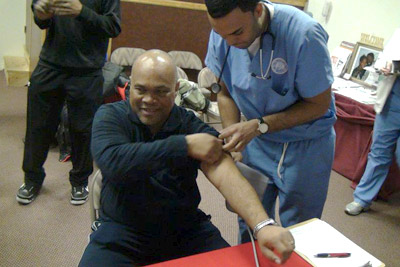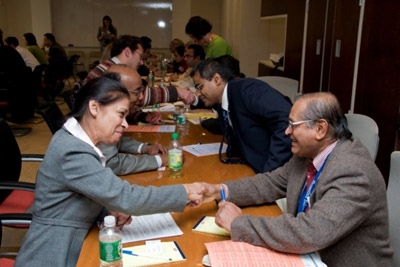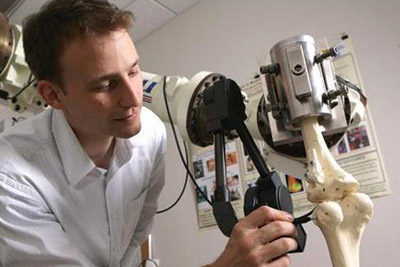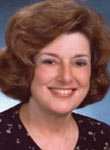Group seeks new ways to help underserved New Yorkers
By Susan S. Lang

From sponsoring "speed dating" events and forging research partnerships to promoting health and wellness by teaching 10-year-olds ballroom dancing, the Clinical and Translational Science Center (CTSC) at Weill Cornell Medical College in New York City is using many ways to promote interdisciplinary research flowing from lab bench to community.

CTSC's ultimate goal is "to expedite new, effective patient treatments, educate and mentor the translational research scientists of the future, and enhance health care among the underserved in surrounding communities," says endocrinologist Julianne Imperato-McGinley, program director of CTSC and associate dean of translational research and education.
The Weill Cornell CTSC consortium was funded in 2007 with a five-year, $49 million grant from the National Institutes of Health (NIH), with a renewal under way. The NIH supports 60 such centers around the nation.

"But ours is unique," says Imperato-McGinley. Unlike centers that pair medical schools with area hospitals, the CTSC not only partners with some of Manhattan's most impressive medical giants -- Hospital for Special Surgery; Memorial Sloan-Kettering Cancer Center; NewYork-Presbyterian Hospital; Hunter College's School of Nursing and Center for Study of Gene Structure and Function; in addition to Weill Cornell and its partners, including its medical center and graduate school -- but also with Cornell University Cooperative Extension-New York City. That organization's experience reaching underserved populations is critical, she says, as is Cornell in Ithaca, which provides expert collaboration on CTSC projects.
Every CTSC project, Imperato-McGinley says, must not only be interdisciplinary but also inter-institutional. To help researchers find collaborators, the CTSC sponsors "speed dating" events for clinicians and research scientists, giving them three minutes to chat before meeting another potential partner, followed by a welcome reception. The CTSC has funded eight inter-institutional and interdisciplinary projects as a result of these events, and some have gone on to obtain their own NIH funding, says Imperato-McGinley. An upcoming networking event will focus exclusively on matching bioengineers with clinical investigators, she added.

The center also awards novel, planning, seed and community health pilot grants that require researchers from different institutions and fields to explore ideas "outside the box." For example, among some 120 seed grants, totaling $6 million, CTSC funds Brian Kirby, associate professor of mechanical engineering in Ithaca, and oncologist David Nanus of Weill Cornell, through a novel award to capture prostate cancer cells and test them in the lab to gauge sensitivity to chemotherapies. It's one of 25 research collaborations that involve Ithaca scientists.
The CTSC also serves as the focus of investigator-initiated clinical and translational research at Weill Cornell. Its education program offers three degree options for classroom-based training: an advanced certificate in clinical and translational investigation, a certificate in clinical research methodology, and a master's degree in clinical and translational investigation.
In addition, Grand Rounds Lectures keep CTSC scientists up to date on groundbreaking work, such as the research of Michael Shuler, professor of chemical and biomolecular engineering at Cornell. He recently spoke on how microfabricated devices with cell cultures provide a viable alternative to animal models to predict drug toxicity and efficacy.
More Clinical and Translational Science Center resources
In addition to the activities in the accompanying article, CTSC also hosts:
- a research unit with adult and pediatric inpatient and outpatient facilities to support studies;
- walk-in clinics for researchers to get advice on regulatory compliance issues, grant applications and budget development;
- a laboratory to perform assays not otherwise available and a molecular biology unit to provide the technologies to conduct advanced molecular biological tests;
- a bionutrition unit, including a metabolic kitchen, to conduct special tests and analyze food intake, records and questionnaires and other specialized techniques for food and nutrition studies;
- biostatistical consulting and data management services for clinical and translational studies;
- research support to assist researchers prepare or carry out study protocols; and recruitment assistance to help researchers find ethnically, racially and age-diverse patient populations in the New York area and throughout the country for their studies.
To reach underserved populations in the metropolitan area, physicians, nurses and other experts use interactive video conferencing. They've educated church congregations, for example, on such health issues as heart disease and diabetes. They've also worked with senior centers on how to prevent falls, and with National Guard units in Brooklyn and Queens on coping with anxiety, traumatic stress and other mental health issues.
Furthermore, Hunter nursing students pair up with Weill Cornell medical students at health fairs across the city to screen uninsured people for cardiovascular disease, counseling and informing them about free clinics. Another project involves ballroom dancing workshops in schools as an exercise modality to get 10-year-olds moving, and to monitor such vitals as changes in heart rate and body mass.
Some CTSC projects also use social media to reach the public, such as a Facebook page that helps disseminate research findings in lay language and debunks health myths.
These wide-ranging efforts, among others (see sidebar) "are breaking down institutional barriers separating scientific disciplines to accelerate the clinical application of basic science discoveries," Imperato-McGinley concludes.
Get Cornell news delivered right to your inbox.
Subscribe